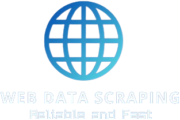In our data-driven era, the worth of big data is significant, with projections from Research and Markets suggesting a leap from $162.6 billion in 2021 to an impressive $273.4 billion by 2026.
To tap into this wealth of information from publicly available sources like websites, individuals often turn to web scraping. While an array of tools exists, mastery of a versatile programming language like Python empowers individuals to create unique code for efficient and precise website scraping.
Deciphering Web Scraping: Understanding the Process

Defining Web Scraping: Web scraping, synonymous with web data extraction or web harvesting, involves extracting data from websites. Although manual extraction is feasible, automated tools shine when dealing with projects demanding extraction from numerous web pages. These tools proficiently collect and export data for in-depth analysis, often into central databases, spreadsheets, or APIs.
Uses Across Industries: Web scraping finds applications across diverse industries—insurance, banking, finance, trading, eCommerce, sports, and digital marketing. From informing decision-making to lead generation, risk management, strategy guidance, and product and service creation, its utility is extensive.
Exploring Key Applications of Web Scraping
1. Price Intelligence: Monitoring competitor prices and strategically responding involves web scraping. Retailers leverage eCommerce data extraction to gather product and pricing information, aiding in dynamic pricing, revenue optimization, and competitor monitoring.
2. Market Research: Market researchers utilize web data extraction to inform trend analysis, research and development, competitor analysis, and price analysis, among other areas of study.
3. Lead Generation: Businesses leverage web scraping to gather contact information, enhancing effective sales and marketing campaigns. Extracting names, job titles, email addresses, and cellphone numbers allows companies to reach out, generating more leads and sales.
4. Brand Monitoring: Facilitating real-time data extraction from social media platforms and review sites, web scraping software contributes to brand monitoring. Analyzing aggregated data helps gauge brand sentiment.
5. Business Automation: Web scraping tools automate the extraction of large data sets from websites, ensuring consistency, speed, and structured data retrieval.
6. Real Estate: Essential for obtaining up-to-date and accurate real estate listings, web scraping includes property details, sale prices, rental income, amenities, and market trends analysis.
7. Alternative Data for Finance: Investors use web-scraped data for insights from SEC filings, monitoring news and stock market performance, sentiment analysis, and extracting financial data.
8. News and Content Marketing: Businesses, political campaigns, and marketing agencies employ web scraping tools to monitor brand sentiment, polls, and critical stories from different industries.
Why Choose WebDataScraping for Your Web Scraping Needs?
WebDataScraping stands out as a reliable partner for businesses seeking top-notch web scraping solutions. With a commitment to quality, ethical practices, and cutting-edge technology, WebDataScraping ensures that clients can harness the full potential of web scraping without compromising on integrity.
In a world where data drives success, web scraping emerges as a critical tool for businesses to gain a competitive advantage. WebDataScraping paves the way for clients to navigate the vast landscape of web scraping, unlocking new possibilities for informed decision-making and strategic growth.
